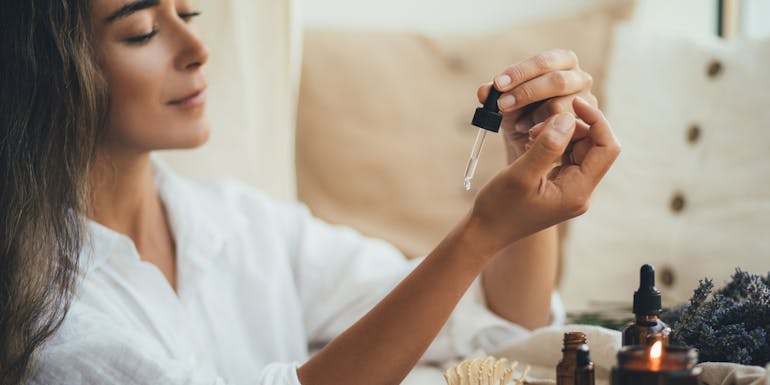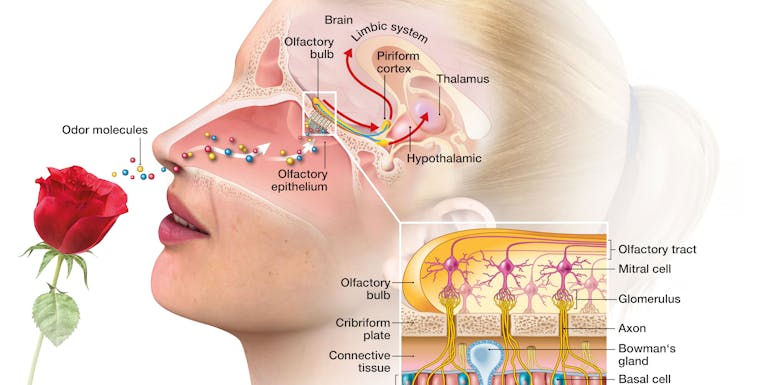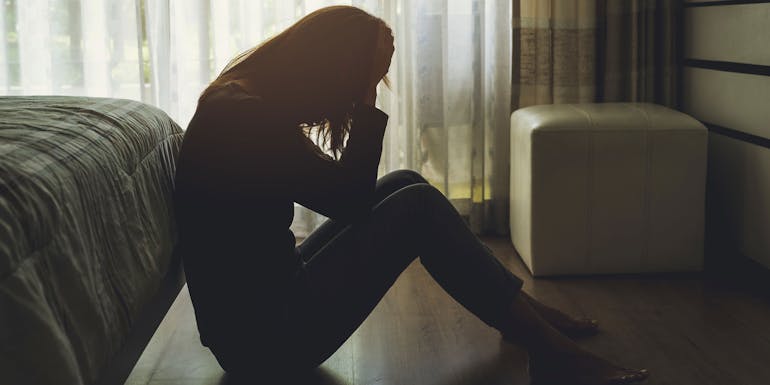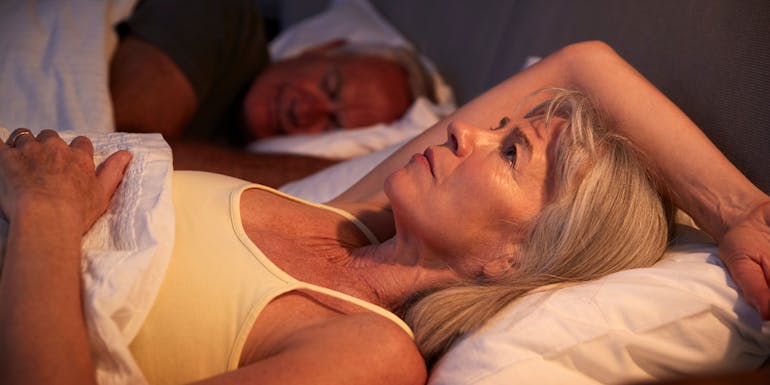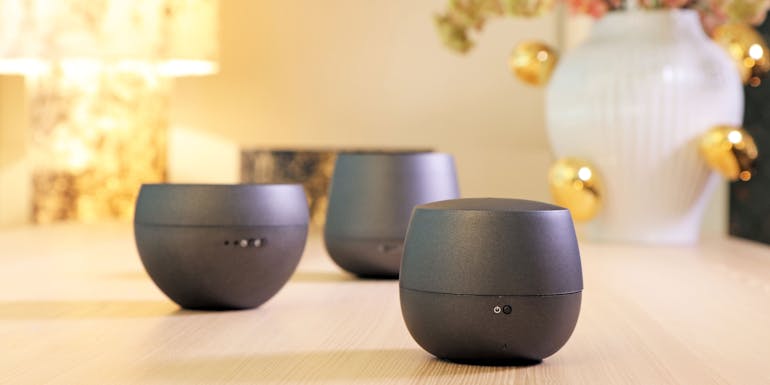
Nadine Walder , 23 March 2023
Aromatherapy
Essential oils and emotions: how do they work together?
Aromatherapy is known for its beneficial effect and positive impact on our physical and emotional well-being. Essential oils have been used for aromatherapy for centuries, particularly in alternative medicine. In recent years, it has also found its way into western medicine. The use of essential oils to support the regulation of emotion is an emerging area of research. A growing number of studies have shown that using essential oils can be beneficial for depressive moods, anxiety and other emotional disorders.
Read this article to find out how essential oils can affect your emotional well-being, the scientific findings behind this and what to take into account with regard to aromatherapy.
Emotions and essential oils – the effect of aromatherapy on the regulation of emotion
Essential oils have been used in various cultures for centuries to improve well-being and treat various ailments. These oils are derived from various plants and can be used for a wide range of therapeutic applications such as improving sleep, relieving pain and enhancing concentration and mood.
One important use for aromatherapy is to support the regulation of emotion. This term describes the process used by an individual to influence the experience, intensity, duration, time and expression of activated emotions. Emotions are an important part of our life but can also lead to psychological disorders such as depressions and anxiety. Aromatherapy can help regulate emotions and thus help improve psychological well-being. For example, a study from 2006 conducted with the participation of college students showed that the use of lavender oil can help reduce depression and insomnia (1).
The effect of essential oils on the regulation of emotion is due to their chemical components which enter the brain’s limbic system. This system is the centre for emotions and behaviours among other things. It regulates our moods, emotions and motivations as well as our behaviour. When essential oils are applied topically or inhaled, they can influence the limbic system directly and have a positive influence on mood and emotions as a result.
In the following sections, I would like to present to you three concrete fields of application which have been the subject of scientific research and have yielded significant results. I would like to present to you the use of aromatherapy for treating depression, anxiety and sleep disorders. However first of all, I would like to look at a number of important points that you should definitely keep in mind as you read on:
- There are a variety of studies on the use of aromatherapy which prove the effectiveness of essential oils at improving mood and alleviating the symptoms of patients with emotional problems. Nevertheless, there are also studies which did not produce any significant results. As is the case in many areas of research, further research is also required here in order to determine the exact effect mechanisms and optimal methods of application.
- Aromatherapy alone is not an effective treatment for severe psychological disorders such as depression and anxiety. However, it can effectively complement standard treatments although in such cases, aromatherapy should only be used on the recommendation of a specialist.
- Even if aromatherapy is carried out using natural essential oils, caution should generally be exercised during use. Plant essences can also be harmful if used incorrectly or in the wrong concentration. Doctors and pharmacists can provide expert advice on this.
- The studies listed for the individual areas of application only provide a brief insight into the field of research. In each of these areas, there are numerous other studies that show significant – but also non-significant – results.
* In a scientific context, the term ‘significant’ indicates that a difference perceived did not occur by chance and also actually means something. It means that there is a difference not only in the random sample but also in the population.
Aromatherapy for depression: what evidence is there of this?
Depression is a common and severe psychological disorder which is associated with symptoms such as feelings of despondency and sadness. There are research results which indicate that aromatherapy can effectively complement conventional therapy.
A systematic review from 2017 studied the effectiveness of aromatherapy as a treatment for symptoms of depression. The researchers found a total of 12 studies that met their criteria for inclusion. They established that in total, seven out of the twelve studies found improvements in the symptoms of depression. It also showed that aromatherapy massages are more effective than aromatherapy by means of inhalation (2).
A further study from 2009 also studied the effectiveness of aromatherapy for people with symptoms of depression. In this study, a total of six individual studies based on aromatherapy massage were analysed. The researchers found mixed results and conclude that aromatherapy can be used as a complementary and alternative therapy for patients with depression (3).
A third study from 2016 examined the effect of inhaling the scent of lavender on stress, anxiety and depression in women after childbirth. The study was based on a trial group and a control group that did not inhale the oil. The results showed that the women who inhaled the lavender oil demonstrated significantly lower levels of stress, anxiety and depression than the women in the control group (4).
There are numerous other studies which show similar results. Even if these results are very promising, it is important to note that further research is required in order to confirm the effectiveness of aromatherapy as a treatment for depression.
Essential oils for anxiety: latest findings
Anxiety is a psychological problem characterised by agitation, worry and physical symptoms such as outbreaks of sweating and palpitations. Here too, there is evidence from research that aromatherapy can help alleviate anxiety.
A study from 2016 analysed the effect of inhaling rose water on anxiety among haemodialysis patients. In this study, one group inhaled rose water for four weeks while the control group received no intervention. It showed that inhaling rose water significantly reduced anxiety compared to the control group (5).
A systematic overview from 2013 analysed the effectiveness of lavender oil as a treatment for anxiety disorders among other things. The researchers found, for example, that for 221 patients suffering from states of anxiety, the anxiety-reducing effect of lavender was better than that of the placebo. Lavender also improved accompanying symptoms such as agitation, sleep disorders and somatic complaints and had a positive influence on general well-being and quality of life (6).
A further meta-analysis from 2021 examined the effectiveness of lavender as a treatment for anxiety, depressions and physiological parameters. The results showed that the lavender aromatherapy had a significant impact in reducing anxiety and depression. Administration over several sessions increased the anxiety-reducing effect (7).
Such meta-analyses support the results of individual studies and indicate that aromatherapy can be a promising way of complementing anxiety-reducing therapy. But here too, further research is required in order to verify the exact mechanisms.
Aromatherapy for sleep disorders: does it really help?
Aromatherapy is frequently used to promote sleep and treat sleep disorders. There is clear evidence to prove that essential oils can help with sleep disorders.
In 2018, Lillehei and colleagues investigated the effect of lavender oil on sleep disorders. The participants who inhaled lavender oil had significantly better sleep quality compared to the control group (8).
A meta-analysis from 2021 analysed the effects of aromatherapy on sleep quality based on 16 individual studies which met the researchers’ criteria for inclusion and exclusion. The results showed that aromatherapy had a significant impact in terms of improving sleep quality. A sub-analysis showed that there was an obvious therapeutic effect within the inhalation group but not within the massage group. That could possibly be due to the fact that the number of studies in which massage was used was too small in the analysis (9).
A further meta-analysis from 2022 examined the effectiveness of aromatherapy on the sleep quality of people with cancer. The results showed that aromatherapy significantly improved the sleep quality of cancer patients. Aromatherapy with lavender oil was found to be most effective (10).
Aromatherapy is a promising alternative method of treatment for sleep disorders. In various studies, lavender oil in particular has proved to be effective but rosewood oil, bergamot oil and ylang-ylang oil can help too. But again, they should only be used on the recommendation of a specialist.
Aromatherapy in psychiatry as a complementary therapy
Today, aromatherapy is offered as a complementary therapy in some psychiatric institutions such as Psychiatrie St. Gallen, for example. The service is intended for patients who are looking for an effective and simple application to complement other therapies. The University Psychiatric Clinics (UPK) Basel also offer aromatherapy to complement standard therapy. The aim is for patients to learn how fragrances can be used in a positive way.
So aromatherapy is a promising way of complementing conventional therapy for emotional disorders and can have a positive influence on the regulation of emotion. Of course, aromatherapy is not only used in a professional environment or for psychological disorders. Naturally, you can also use essential oils at home and if you want to have a positive impact on your emotions in general or reduce your stress levels, for example. Essential oils are also easy to use – you can apply them to your skin, add them to a bath or also disperse them using an aroma diffuser. Always pay attention to the recommended uses in each case.
In our shop, you will find not only our aroma diffusers but also a range of essential oils. For home use, the combination of aroma diffuser and essential oil is a very easy way of introducing yourself to the world of aromatherapy and experiencing the positive effects of fragrances for yourself. Try out our fragrances and you will be amazed at the effect they have on your emotional well-being.
If you have questions related to indoor room climate, please get in touch with us. Or subscribe to our newsletter to regularly get informed about current topics regarding indoor climate, experience reports or Stadler Form insights.
Sources
- Lee, I. S. & Lee, G. J. (2006). Effects of lavender aromatherapy on insomnia and depression in women college students. Journal of Korean Academy of Nursing, 36(1), 136-143. DOI: https://doi.org/10.4040/jkan.2006.36.1.136
- Sánchez-Vidaña, D. I., Ngai, S. P., He, W., Chow, J. K., Lau, B. W. & Tsang, H. W. (2017). The Effectiveness of Aromatherapy for Depressive Symptoms: A Systematic Review. Evidence-Based Complementary and Alternative Medicine, vol. 17, Article ID 5869315, https://doi.org/10.1155/2017/5869315
- V.W.C. Yim, Adelina K.Y. Ng, Hector W.H. Tsang & Ada Y. Leung (2009). A Review on the Effects of Aromatherapy for Patients with Depressive Symptoms. The Journal of Alternative and Complementary Medicine. Feb 2009.187-195.http://doi.org/10.1089/acm.2008.0333
- Kianpour M, Mansouri A, Mehrabi T, Asghari G. Effect of lavender scent inhalation on prevention of stress, anxiety and depression in the postpartum period. Iran J Nurs Midwifery Res. 2016 Mar-Apr;21(2):197-201. doi: 10.4103/1735-9066.178248. PMID: 27095995; PMCID: PMC4815377.
- Barati F, Nasiri A, Akbari N, Sharifzadeh G (2016). The Effect of Aromatherapy on Anxiety in Patients. Nephrourol Mon. 2016 Jul 31;8(5):e38347. doi: 10.5812/numonthly.38347. PMID: 27878109; PMCID: PMC5111093.
- Koulivand P. H., Ghadiri M. K. & Gorji A. (2013). Lavender and the Nervous System. Evidence- Based Complementary and Alternat Medicine, vol. 2013, Article ID 681304, https://doi.org/10.1155/2013/681304
- Kim, M., Nam, E. S., Lee, Y., Kang, H. (2021). Effects of Lavender on Anxiety, Depression, and Physiological Parameters: Systematic Review and Meta-Analysis, Asian Nursing Research, Volume 15, Issue 5, 2021, 279-290, https://doi.org/10.1016/j.anr.2021.11.001
- Lillehei, A. S., Halcón, L. L., Savik, K. & Reis, R. (2018). Effect of Inhaled Lavender and Sleep Hygiene on Self-Reported Sleep Issues: A Randomized Controlled Trial. J Altern Complement Med. 2018 Feb;24(2):e179-e189. doi: 10.1089/acm.2017.0142. Epub 2017 Nov 14. PMID: 29140110.
- Tang, Y., Gong, M., Qin, X., Su, H., Wang, Z. & Dong, H. (2021). The Therapeutic Effect of Aromatherapy on Insomnia: a Meta-Analysis, Journal of Affective Disorders, Volume 288, 2021, 1-9, https://doi.org/10.1016/j.jad.2021.03.066
- Cheng, H., Lin, L., Wang, S. et al. Aromatherapy with single essential oils can significantly improve the sleep quality of cancer patients: a meta-analysis. BMC Complement Med Ther 22, 187 (2022). https://doi.org/10.1186/s12906-022-03668-0












